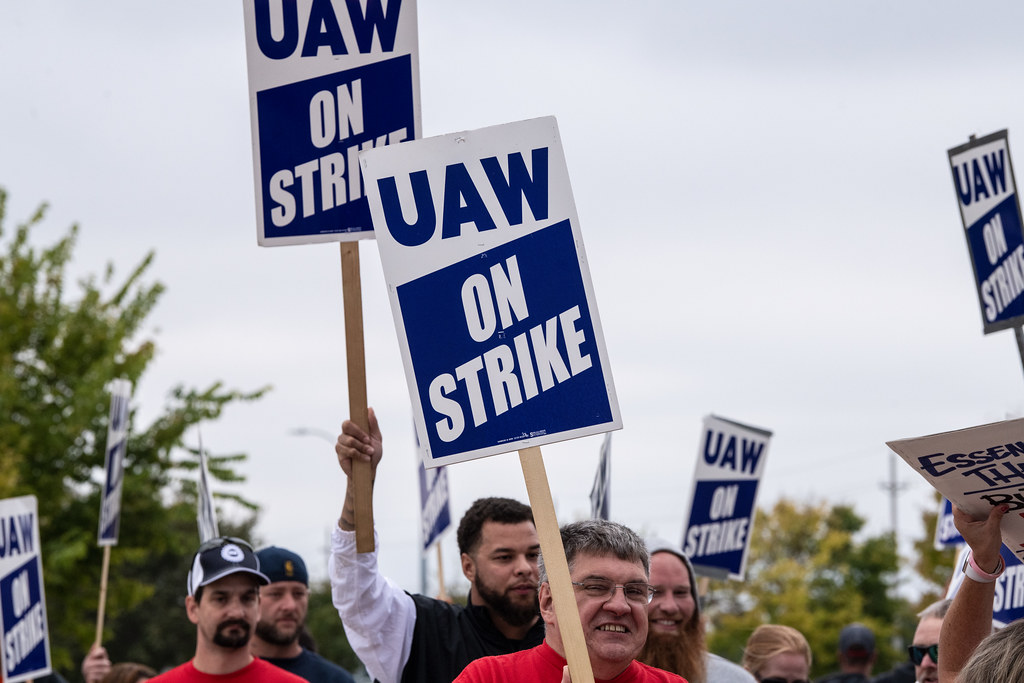After failing to negotiate a new contract, thousands of the United Auto Workers union walked off their jobs, beginning an unprecedented strike against the auto industry. Although UAW’s demands are deemed ambitious, American workers deserve to be adequately compensated for their labor so contract negotiations must be resumed.
The UAW is striking against car makers that are collectively known as The Big Three, a title that refers to the three largest car manufacturers in America: General Motors, Ford Motors and Stellantis, a Chrysler parent plant.
Autoworkers are asking for livable wages, healthcare benefits, reasonable working hours and retirement benefits, all achievable by the largest car manufacturers.
The strike is led by UAW’s first democratically elected president, Shawn Fain, after an investigation of large-scale corruption inside the union caused many workers to lose faith in its leadership. He ran to end corruption, win back what the union had given up in concessions in the 1970s and fight for work-life balance for auto workers.
Shortly after being sworn in, Fain commented that the UAW will “come together to ready ourselves for the war against our only one and only true enemy, multibillion-dollar corporations and employers that refuse to give our members their fair share.”
After the Big Three failed to meet the union’s demands, Fain initiated a targeted walkout at Ford’s Bronco plants in Detroit, a Stellantis Jeep factory in Ohio and a GM pickup plant in Missouri, the Wall Street Journal reported. Overall, 13,000 workers were ordered to leave their posts.
UAW is demanding a 40% pay increase over four years, an end to tiered employment, better employment benefits and worker protections, according to The Washington Post.
In response, companies attempted to compromise to a 17.5-20% increase across four years. They claimed that anything higher would put them at a competitive disadvantage with other companies due to the growing popularity of electric vehicles which demands significant investments.
However, UAW believes that the companies’ CEOs’ increased earnings allow for a hefty increase in workers’ pay. For example, NPR reported that General Motors’ CEO made nearly $30 million in 2022, which is 362 times the median GM employee’s paycheck.
The difference in wages gives the union reason to believe that the Big Three can afford to comply with their demands while maintaining their competitive edge.
Stellantis said they made an offer that “would see current full-time hourly employees earning between $80,000 and $96,000 a year by the end of the contract, constituting a 21.4% compounded increase,” according to CNBC.
Additionally, GM labeled the strike unnecessary and accused the union of “not taking the talks seriously and planning a monthslong strike to support an ‘ideological agenda.’”
On the other hand, the UAW reports that Ford was serious about reaching a deal. The company has agreed to meet many of the union’s demands, such as reinstating the cost-of-living expenses, and to continue working diligently to agree on other terms.
Although some progress was made with Ford, Fain said GM’s and Stellantis’ offers were unacceptable. He also added, “We will keep going, keep organizing and keep expanding the stand-up strike as necessary.”
In fact, a week after the strike initially began, the UAW expanded to 38 more locations across 20 states, targeting GM and Stellantis facilities. Facilities were affected nationwide, including 18 GM plants throughout 13 states. For Stellantis the strikes affected 20 facilities in 14 states.
As the UAW is determined to fight, side effects for the public in the face of price increases may arise. However, it is important to remember what the workers are requesting are bare minimum conditions from companies who are making billions each year.
The reasons autoworkers are striking are something that should not be fought so hard for and instead be provided as a given.
Moreover, an extended strike could complicate the government’s attempts to fight inflation by pushing up the costs of new cars as fewer will be produced.
CNN Business reports that according to estimates, $440 million worth of national income could be lost if all the UAW members strike for two weeks. If the strike lasts eight weeks, up to $9.1 billion in national income could be lost.
In response, President Joe Biden, who is famously pro-union, traveled to Michigan on Sept. 26 in support of the striking workers.
Four days before, Biden took to social media platform X, formerly known as Twitter, to announce that he would “stand in solidarity with the men and women of UAW as they fight for a fair share of the value they helped create.”







